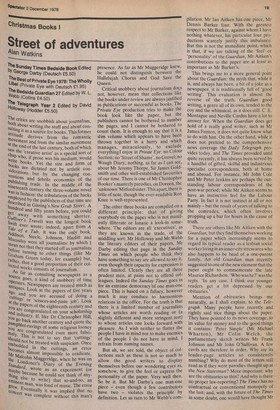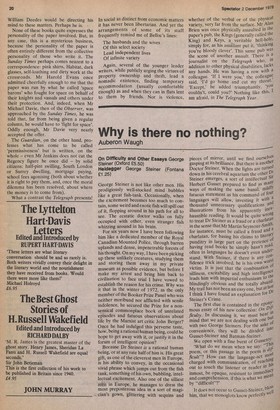Christmas Books I
Street of adventures
Alan Watkins
The Sunday Times Bedside Book Edited by George Darby (Deutsch £5.50) The Best of Private Eye 1978: The Wholly Libel (Private Eye with Deutsch £1 .95) The Bedside Guardian 27 Edited by W. L. Webb (Collins £4.50) The Telegraph Year 2 Edited by David Holloway (Hodder £5.50) The critics are snobbish about journalism, both about writing the stuff and about consulting it as a source for books. This former attitude derives from the romantic Movement and from the similar movement at the end of the last century, both of which saw the 'creative artist' as a special sort of Chap who, if prose was his medium, would write books. Yet the size and form of books are dictated not by artistic considerations but by the changing conventions and febrile economics of the pu. blishing trade. In the middle of the nineteenth century the three-volume novel was in fashion: the tribulations of the hacks employed by the publishers of that time are described in Gissing's New Grub Street. A hundred and fifty years before, you could get awa y with something shorter. y with something shorter. Gulliver's Travels was the longest book Swift ever wrote; indeed, apart from A Tale .of a Tub, it was the only Addison book. , Steele, Johnson, Hazlitt . and Macaulay were all journalists: by which. I Mean not that they started off as journalists before turning to other things (like Mr Graham Green today, for example) but, rather, that a good proportion of their collected works consists of journalism. As far as consulting newspapers as a source goes, a kind of snobbery of time oPerates. Newspapers are treated much as antiques. Look at the papers of five years g() and you are accused of doing a c:ttnigs' or 'scissors-and-paste job'. Look at the papers of the eighteenth century and You are congratulated on your scholarship and industry. If, like Dr Christopher Hill, You go back another century and quote the Paninhlet-ravings of some religious looney You are congratulated even more fulsomely. This is not to say that 'cuttings' Mould not be treated with suspicion. Once embedded in the cuttings, an error .comes almost impossible to eradicate. ,,allLr Malcolm Muggeridge, when he was on `,,He Londoner's Diary of the Evening 'llandard, wrote as an experiment (or Inv aybe because he could not think of any 2114 else to write) that so-and-so, an eminent man, was fond of music. The error grew. Eventually it was implied that no concert was complete without this man's presence. As far as Mr Muggeridge knew, he could not distinguish between the Hallelujah Chorus and God Save the Queen. Critical snobbery about journalism does not, however, mean that collections like the books under review are always justified as publications or successful as books. The Private Eye production tries to make the book look like the paper, but the publishers cannot be bothered to number the pages, and I cannot be bothered to count them. It is enough to say that it is a slim volume which appears to have been thrown together in a hurry and which manages, miraculously, to exclude everythingI enjoy in Private Eye: no Colour Section; no 'Street of Shame', no Grovel; no Waugh Diary; nothing, as far as I can see, about Mr Jeremy Thorpe, Sir James Goldsmith and other well-established favourites of our time. There is one of Mr Christopher Booker's masterly parodies, on Doreen, the 'unknown' Mitford sister. This apart, there is little of note, though the ever-readable Ron Knee is well-represented.
The other three books are compiled on a different principle: that of giving everybody on the paper who is not manifestly illiterate or lunatic a look-in somewhere. The editors are all 'executives', as they are known in the trade, of the middling sort: Mr Holloway and Mr Webb the literary editors of their papers, Mr Darby editing that page in the Sunday Times on which people who think they have something to say are allowed to say it, even though their capacity for expression is often limited. Clearly they are all three prudent men, at pains not to offend colleagues. Indeed the Sunday Times goes in for an extreme democracy bf one man-one piece. This is based on a fallacy, however much it may conduce to harmonious relations in the office. For the truth is that there is a limited number of journalists whose articles are worth reading or (a slightly different and more stringent test) to whose articles one looks forward with pleasure. As I wish neither to flatter the people I have in mind nor to make enemies of the people I do not have in mind, I refrain from naming names.
But ah, we are told, the object of collections such as these is not so much to allow the good writers to display themselves before our wondering eyes as, somehow, to give the feel or express the personality of the paper. Very well then. So be it. But Mr Darby's one man-one piece — even though a few contributors have two — violates the principle by definition. Let us turn to Mr Webb's corn pilation. Mr Ian Aitken has one piece, Mr Dennis Barker four. With the greatest respect to Mr Barker, against whom I have nothing whatever, his particular four productions scarcely justify this imbalance. But this is not the immediate point, which is that, if we are talking of the 'feel' or 'personality' of the Guardian, Mr Aitken's contributions to the paper are at least as important as Mr Barker's.
This brings me to a more general point about the Guardian: the myth that, while it is, and always has been, a bit of a joke as a newspaper, it is traditionally full of 'good writing'. This evaluation is almost the reverse of the truth. Guardian good writing, a genre all of its own, tended to the coy and the whimsical, as it does still. C. E. Montague and Neville Cardus have a lot to answer for. When the Guardian does get hold of a really good writer, such as Mr James Fenton, it does not quite know what to do with him. On the other hand, while it does not pretend to the comprehensive news coverage the Daily Telegraph provides today, and The Times provided until quite recently, it has always been served by a handful of gifted, skilful and industrious specialist correspondents, both at home and abroad. For instance, Mr John Cole and Mr Peter Jenkins are perhaps the outstanding labour correspondents of the post-war period; while Mr Aitken seems to have an instinctive feel for the Labour Party. In fact it is not instinct at all or not mainly — but the result of years of talking to the comrades, which often involves propping up a bar for hours in the cause of truth.
There are others like Mr Aitken with the Guardian, but they find themselves working for a paper which increasingly seems to regard its typical reader as a lesbian social worker living in an inner-city stress area who also happens to be head of a one-parent family. An old Guardian man recently suggested to one of the new element that the paper ought to commemorate the late Maurice Richardson. 'Who was he?' was the reply. 'In any case. I think our younger readers get a bit depressed by our obituaries.'
Mention of obituaries brings me naturally, as I shall explain, to the Tele graph. Many people have recently and rightly said nice things about the paper. They have pointed to its news coverage, to its value for money and to the good things it contains: 'Peter Simple' (Mr Michael Wharton), Mr Colin Welch, the parliamentary sketch writers Mr Frank Johnson and Mr John O'Sullivan. A few cavils are therefore in order. Why are its leader-page articles so consistently numbing? Why do most of the letters still read as if they were parodies thought up at the New Statesman? More important: why are the obituaries so thin? And why is there no proper law-reporting? The Times has no contractual or conventional monopoly of the last; and, with the future of The Times in some doubt, one would have thought Mr William Deedes would be directing his mind to these matters. Perhaps he is. .
None of these books quite expresses the personality of the paper involved. But, in any case, this is a mysterious business, because the personality of the paper is often entirely different from the collective personality of those who write it. The Sunday Times perhaps comes nearest to a correspondence: pink shirts, Habitat, dark glasses, self-loathing and dirty work at the crossroads. Mr Harold Evans once admitted cheerfully enough to me that the paper was run by what he called 'space barons' who fought for space on behalf of their knights and vassals and others under their protection. And, indeed, when Mr Michael Davie, then of the Observer, was approached by the Sunday Times, he was told that, far from being given a regular column, he would have to 'fight for space'. Oddly enough, Mr Davie very nearly accepted the offer.
The Guardian, on the other hand, professes what has come to be called 'permissiveness' but• is written, on the whole — even Mr Jenkins does not cut the Regency figure he once did — by solid citizens: half-pint swilling, South London or Surrey dwelling, mortgage paying, school fees agonising (both about whether • it is right to pay them, and, once the moral dilemma has been resolved, about where the money is to come from).
What a contrast the Telegraph presents! In social as distinct from economic matters it has never been libertarian. And yet the arrangements of some of its staff frequently remind me of Belloc's lines: The husbands and the wives Of this select society Lead independent lives Of infinite variety Again, several of the younger leader• writers, while publicly urging the virtues of property ownership and thrift, lead a nomadic existence, finding temporary accommodation (usually comfortable enough) as and when they can in flats lent to them by friends. Nor is violence, whether of the verbal or of the physical variety, very far from the surface. Mr Alan Brien was once physically assaulted in the paper's pub, the Kings (generally called the • King) and Keys, a veritable hell-hole, simply for, as his assailant put it, 'thinking you're bloody clever'. This same pub was the scene of another assault. There is .a journalist on the Telegraph who, lit addition to other physical disabilities, lacks any hands. He was having a row with a colleague. 'If I were you,' the colleague, said, `I'd go home and cut my throat. 'Except,' he added triumphantly, `Y°13 couldn't, could you?' Nothing like this, I am afraid, in The Telegraph Year.







































 Previous page
Previous page